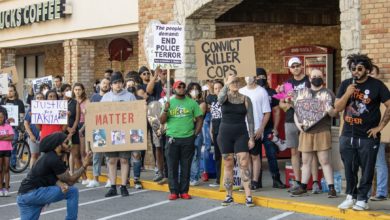Photo courtesy of UpriseRI. Used with permission.
The movement against police terror in Providence, Rhode Island, has seen tremendous support since reigniting this summer. Ten thousand people marched on the State House on June 5, while the most militant protesters have marched regularly, sometimes several nights a week. A strong demand emerged, put forth by militant youth movement PROV-X: defund the Providence Police Department by 70 percent.
“It’s very obvious the Providence Police Department and Rhode Island State Police have been essentially on a spree,” said Andira Alves, a PSL organizer who has regularly spoken out at protests. “Just about every action, most of them that I’ve attended, they have started riots.”
Providence Police have escalated their violence against protesters in the past six months. But brutality towards protesters is only one item on a long list of abuse and racial profiling that demonstrates why so many Rhode Islanders are calling to defund.
Grounds for defunding: racist policing past and present
Residents of color have long been aware of the racism of Providence police. At a state government task force session to revise the Law Enforcement Officers Bill of Rights, Director Kiah Bryant of Direct Action for Rights and Equality testified,
“Growing up in Providence I’ve seen so many civil rights violations basically happen at the hands of police on Black and Brown folks, specifically youth. I’ve seen police officers tear a person’s car apart looking for something to arrest these kids with. I’ve seen police officers beat kids up for nothing, for simply talking back. A close and personal friend of mine is currently in a wheelchair because of police officers. Nothing was done. That police officer got a promotion.”
Media records of racial profiling and police violence are sparse, so activists began compiling a database. At least eight incidents have been recorded since June 2020.
The most recent assaults were well documented and publicized. Of these, the October attack on Jhamal Gonsalves has sparked the most anger. The young man was hit by a Providence Police cruiser while driving his moped, then dragged through the street and given narcan while having a seizure. The government promised an investigation, and has published several videos, but has yet to release findings.
Officer Kyle Endres is still working desk duty. Gonsalves is still in a coma.
Police reforms are proving more of a hindrance than a help. The Providence External Review Authority, a civilian board tasked with overseeing investigations of police abuse, was denied a role in the Endres investigation. PERA was established in 2018 as part of the Community Safety Act. The act, a reform law put together by community members and non-profits following the uprising for Black lives of 2014-2015, largely remains unimplemented.
In November, PERA’s Executive Director Jose Batista attempted to further the board’s mission, honoring community requests to release video evidence from April when Sergeant Joseph Hanley repeatedly assaulted a Black man he had already handcuffed. In response, the board fired Batista. They voted on the grounds that he had acted against PERA policy, despite dozens of community testimonies supporting him. “This is not a matter of anyone on the board wanting to release a video,” said board chair Michael Fontaine. “This is about following the rules that we are given.”
Yet following the rules has done little. Out of more than 40 complaints received, PERA has been unable to close a single investigation due to barriers to obtaining evidence put up by the police.
Community activist Enrique Sanchez called the firing a betrayal. “PERA was created to be this option to expose those types of actions. So what the hell was the point of exposing those videos if you terminate your executive director?”
Meanwhile, the city shows no signs of slowing policing. The police budget, representing the salaries and benefits of 420 officers and pensions of several hundred more, was set to increase from $86 million to $88 million in 2021, which included training some 50 new officers. Although city councilor Sabina Matos has called for abolition and others are in favor of defunding, just last week Democrat majority leader Jo-Ann Ryan said that an increase to 500 officers would be ideal.
$88 million would represent 17.4 percent of the city’s budget, outranked in spending only by schools and pensions. Cities of similar size spend anywhere between $45 and $130 million on policing.
Alves says protesters think the money would be spent better elsewhere. “That could go into the schools, which have been making a lot of national news. They’ve reopened schools, there’s no updated ventilation systems. It’s just fans in windows, and it’s freezing now. That’s where the money can go, into making these buildings safe, to canceling rents. Definitely not to the people who landlords are gonna call to kick us out once the eviction moratorium ends.”
Germaine Bruce, a young Black man who was violently arrested on November 7 while helping his friends start their car, recalled how police escalated only after eight or nine officers had arrived on the scene. Numerous testimonies at actions and government hearings since June complete the picture: large numbers of cops and violent policing go hand in hand.
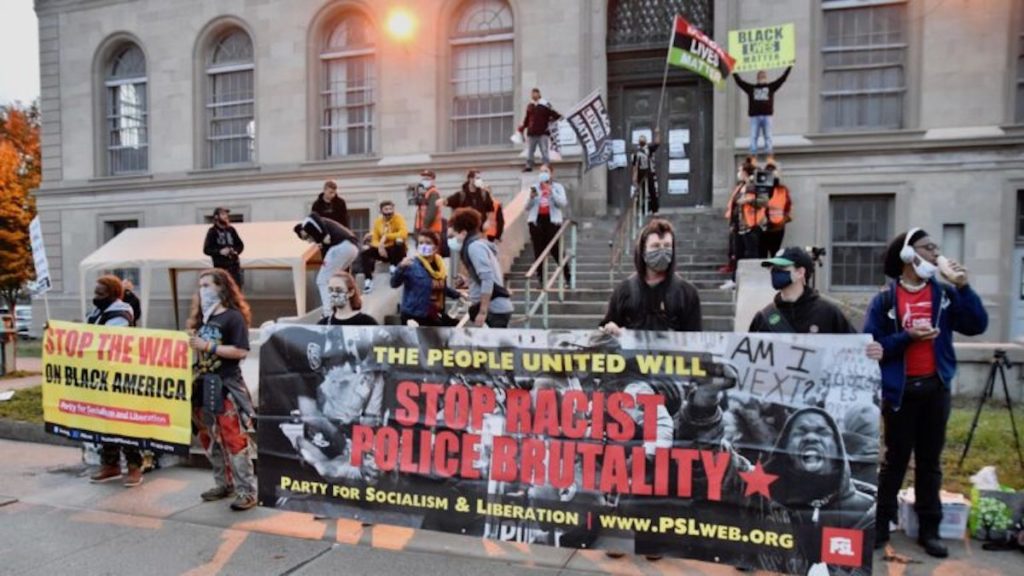
Police try to scare the movement
Protesters are most familiar with the excessive abundance of police. Ever since they marched the streets late on June 5, they have regularly been confronted with line after line of police in full riot gear. Of the actions at which Alves has been present, police “outnumber protesters more times than not.”
As police have grown more aggressive and repressive, they have sought to justify their actions by calling protesters violent. Commissioner Steve Paré recently told the Providence Journal, “Some protests, after that bewitching hour of nighttime, turn violent. If we’re not prepared with resources, we’ll be caught flat-footed.”
These “resources” — which include riot gear, pepper spray and even tear gas — are not limited to Providence Police. On September 23, the night Breonna Taylor’s murderers were not indicted, state troopers used tear gas and pepper spray to force a group of protesters and media to evacuate the highway by climbing a fence, despite a safer exit only being yards away.
Alves recounted to Liberation News:
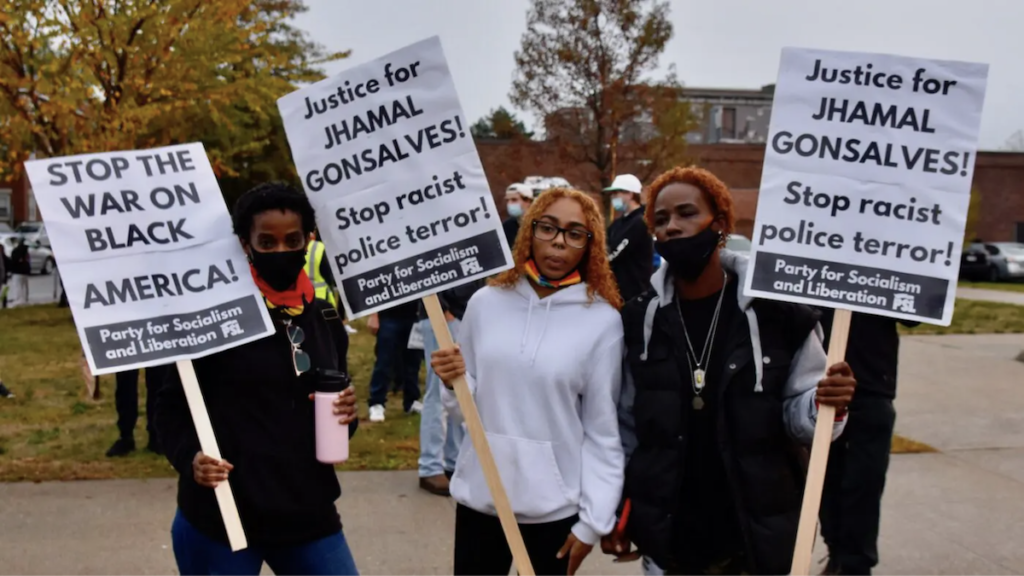
“As I was standing a state trooper stood a few feet from myself and others calling us idiots. Telling us to move… The statie [state trooper] actually shoved someone so they tripped over the ramp onto their back. They just got more angry because we weren’t moving and one statie said ‘run or die.’ When he raised his hand after that I was sure it was his gun he was going to pull out and shoot us. Instead he had two pepper spray cans in his hand and others followed his example. I got sprayed directly in the face… most of us did.
“But they wouldn’t actually let us exit the highway the way we we came on. We were still by the ramp. Instead they forced us, by pepper spraying us until we were cornered to the fence to climb an eight foot fence… I saw someone using their walker to help other protesters get a lift over the fence. Walkers and canes were flying over the fence. Media was forced to climb over too, even though we could have all safely walked off. It was obvious the staties were enjoying watching people struggle.”
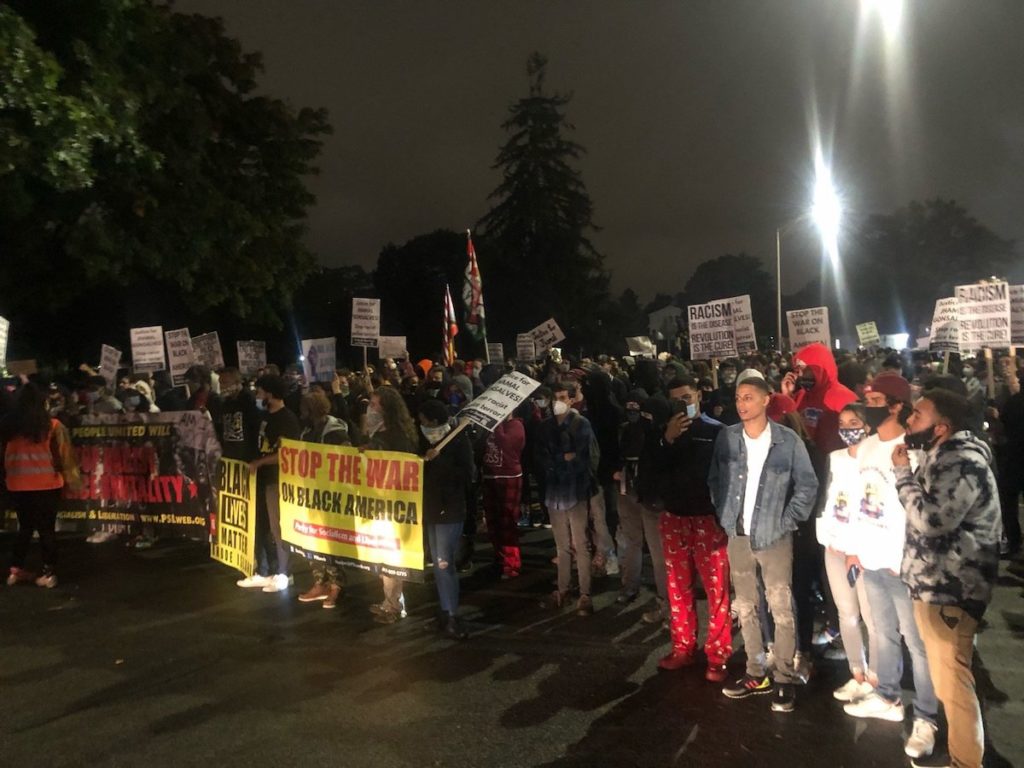
Sanchez recalls a similar assault on a protest on September 28. State troopers “started calling for backup, because they assumed we were being hostile or violent. A good ten to fifteen state patrol cars came and started pepper spraying people.”
Resources alone cannot account for the violence of the police. At a hundreds-strong October 20 protest for Jhamal Gonsalves, 21 people were arrested, including bystanders, medics, and a National Lawyers Guild legal observer.
Activist Justice Gaines summarized the night at a PERA meeting.
“What I saw last night was a disgusting show of force by the Providence Police. They pushed protesters back from the Public Safety Complex and then chased them past the schools and through Elmwood. They chased people, that’s what they did. It was not about protecting a perimeter. It was not about defending themselves. It was about showing and intimidating young people who were out there because a young man was thrown off his moped.”
UpriseRI.
At least 33 people have been arrested at protests since June. Many have experienced abuses such as being held over night, denied phone calls and water, and having officers refuse to wear masks. Many have been fined, and bail is usually upwards of $500.
As police grew more forceful, they also began threatening journalists. At the September 28 protest, an officer told Will James of UpriseRI, “You go back this way and you’ll get locked up.”
Alves, also a reporter for Liberation News, shared this experience. On October 20, she and three other journalists were making their way down to the protest when they were stopped by police.
“We showed our media passes and [a police officer] in a white shirt wouldn’t let us go down. And I asked him, ‘Who’s doing the harming?’ Because he was like ‘It’s not safe for you guys to go down there.’ I was like ‘Well I feel safe, who’s harming who? I know no one’s gonna mess with me.’ And he actually just called backup, and called four other officers to come arrest us. And he was like ‘If y’all don’t leave right now we’re arresting you.’”
The police are doing everything in their power to discredit the movement and remove protesters from the front lines, as they have done across the country. But their attempts to staunch the fire are only feeding the flames.
Continuing the fight
Protesters took to the streets again on Saturday Nov. 21 led by PROV-X, calling to end police terror. A new coalition of activists led by the PSL and PROV-X used the protest to launch a new petition with three key demands: Fire officer Kyle Endres, drop all fines incurred by protesters, and defund the Providence Police by 70 percent.
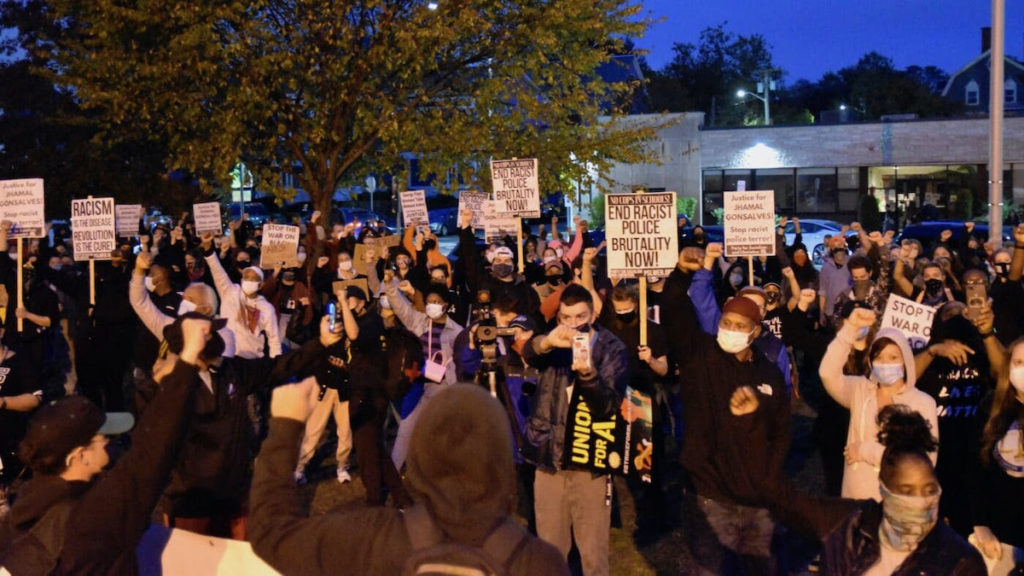
“We need our allies, we need our numbers, we need our people power. And we need to show them that we’re furious and that we’re mobilized and that we’re not gonna back down. Because they don’t back down, and they have the resources to keep themselves afloat,” Brooklyn Toussaint, a PROV-X organizer who helped lead the march, told the crowd. “So we need mutual aid. We need support. We need community action to even out the playing field and to show them that we’re actually contenders, and that a better future is possible because we’re all getting up and fighting for it.”
Bruce spoke out about his wrongful arrest, and Alves highlighted the racist bedrock of policing.
“If racism is a cancer,” Alves said, “then it cannot be allowed to grow as the police budget does year in and year out. If it is a cancer, then we need to cut it out. Cut it out from our schools, our neighborhoods, and from all of society.”




